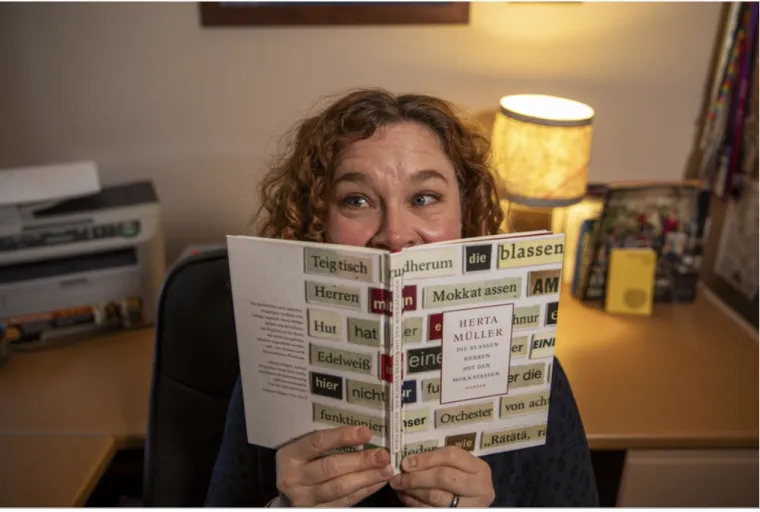Conversations with Rising Stars
CHANTELLE WARNER
As associate dean of Academic and Faculty Affairs for the College of Humanities, Chantelle Warner co-directs the Center for Educational Resources in Culture, Language and Literacy (CERCLL). Her research crosses the fields of applied linguistics, stylistics/poetics and literary studies. She supports undergraduate students and graduate assistant teachers as professor of German and Second Language Acquisition and Teaching. Students are integral to her work as you will learn in this Conversations with Rising Stars…

What initially attracted you to the current focus of research?
My research looks at adult learners of second or additional languages. I was always fascinated by languages and cultures, and the idea of entering into other worlds through them. I was a later-in-life learner of the language I work in, German. I am especially interested in late adolescent and adult learners of languages, and how potentially they not only become proficient in a new language but develop a sense of themselves as a speaker of that language and a relationship with it. My focus on the role of play and playfulness in second language learning came to me unexpectedly. I designed a study that was supposed to look at how digital tools could help learners of German become better communicators and found that they were also doing all kinds of creative and even subversive things with the language and their identities. This caused me to redefine my understanding of second language development.
How have collaborations impacted my work on campus?
From my campus visit in 2007, I was excited about the interdisciplinarity of my home department, German Studies, and the College of Humanities. Moreover, University of Arizona has one of the strongest programs in the US in applied linguistics, the Graduate Interdisciplinary Program in Second Language Acquisition and Teaching, and one of only 16 national language resource centers in the US, the Center for Educational Resources in Culture, Language and Literacy (CERCLL). I’ve collaborated with colleagues across campus throughout my career but working as the co-director of CERCLL for the last 10 years alongside co-director Beatrice Dupuy and our associate director Kate Mackay has allowed me to grow my research as well as mentor and support amazing projects by other colleagues working in second language education and applied linguistics.
Research breakthroughs take time, so what keeps you motivated in your daily duties?
The students! My research is largely classroom-based, so the teaching spaces at the university are also my lab. The nature of this work is very humanistic; I believe in co-creating the experiments with these students. Much of my research also comes directly from collaborations with graduate students who are scholars of second language teaching and learning. Students are at the center of it all, and I’m continually motivated and astounded by their capabilities and how they push back at our assumptions about what adult second language learners can do.
What about your experience at the U of A makes you want to continue your career as a Wildcat?
For me, it is the people who make this campus - the students, the faculty, the staff and the community. At every stage of my career here, I have had the opportunity to learn about new aspects of the campus ecology and how it works. I have been heart-warmed again and again to discover all the care work that sustains the research breakthroughs, innovations and knowledge building and sharing that we do as an academic institution.
When you describe your research to someone for the first time, what’s one major point you hope they understand?
First and foremost, it is not too late for anyone to learn a new language. Also, it is pretty easy to learn any language. Humans were designed to learn and use languages. However, developing beyond the basics does require a little openness and vulnerability. Learning a language isn’t like learning to use a new tool. When our learners talk about their experiences, they use words like “love,” and “joy” but also “anxiety” a lot. It’s an emotional experience. Beyond the pleasure, the potential benefits of studying a language, even for a year or two, are the capacity to step outside one’s normal thought patterns, to empathize and experience what it feels like to be “foreign”, and to be a more sensitize and effective communicator and mediator. These are all characteristics of the adaptive problem-solvers we will want more of in the future!

